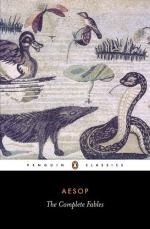THE CROW AND THE RAVEN
A Crow became very jealous of a Raven, because the latter was regarded by men as a bird of omen which foretold the future, and was accordingly held in great respect by them. She was very anxious to get the same sort of reputation herself; and, one day, seeing some travellers approaching, she flew on to a branch of a tree at the roadside and cawed as loud as she could. The travellers were in some dismay at the sound, for they feared it might be a bad omen; till one of them, spying the Crow, said to his companions, “It’s all right, my friends, we can go on without fear, for it’s only a crow and that means nothing.”
Those who pretend to be something
they are not only make
themselves ridiculous.
THE WITCH
A Witch professed to be able to avert the anger of the gods by means of charms, of which she alone possessed the secret; and she drove a brisk trade, and made a fat livelihood out of it. But certain persons accused her of black magic and carried her before the judges, and demanded that she should be put to death for dealings with the Devil. She was found guilty and condemned to death: and one of the judges said to her as she was leaving the dock, “You say you can avert the anger of the gods. How comes it, then, that you have failed to disarm the enmity of men?”
THE OLD MAN AND DEATH
An Old Man cut himself a bundle of faggots in a wood and started to carry them home. He had a long way to go, and was tired out before he had got much more than half-way. Casting his burden on the ground, he called upon Death to come and release him from his life of toil. The words were scarcely out of his mouth when, much to his dismay, Death stood before him and professed his readiness to serve him. He was almost frightened out of his wits, but he had enough presence of mind to stammer out, “Good sir, if you’d be so kind, pray help me up with my burden again.”
THE MISER
A Miser sold everything he had, and melted down his hoard of gold into a single lump, which he buried secretly in a field. Every day he went to look at it, and would sometimes spend long hours gloating over his treasure. One of his men noticed his frequent visits to the spot, and one day watched him and discovered his secret. Waiting his opportunity, he went one night and dug up the gold and stole it. Next day the Miser visited the place as usual, and, finding his treasure gone, fell to tearing his hair and groaning over his loss. In this condition he was seen by one of his neighbours, who asked him what his trouble was. The Miser told him of his misfortune; but the other replied, “Don’t take it so much to heart, my friend; put a brick into the hole, and take a look at it every day: you won’t be any worse off than before, for even when you had your gold it was of no earthly use to you.”




